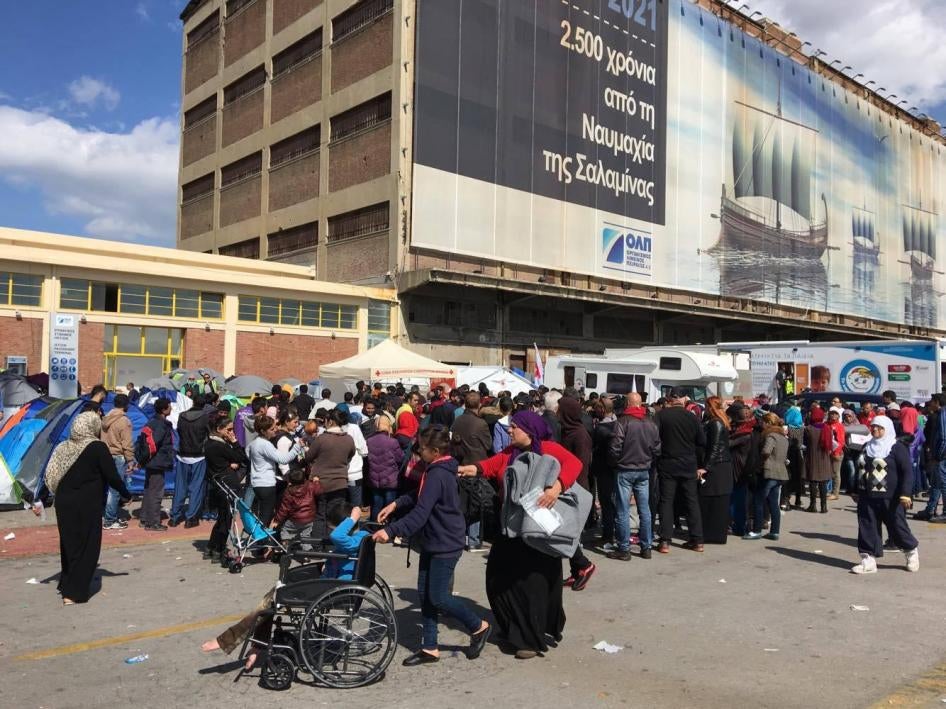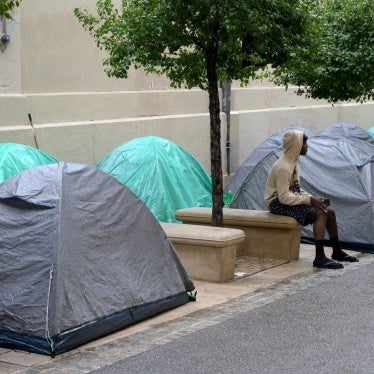EU leaders claim that the March 18 agreement to return “all new irregular migrants crossing from Turkey into Greek islands” back to Turkey, writes Bill Frelick, will take place “in full accordance with EU and international law.” They cited the Procedures Directive, which identifies a “safe third country” and a “first country of asylum” as countries to which asylum seekers can be returned with less than full examination of their asylum claims. Does Turkey qualify?
The directive requires allowing anyone returned to a “safe third country” to request refugee status. But any Syrian, Iraqi, or Afghan returned to Turkey would not be allowed to request refugee status there because Turkey excludes non-Europeans from qualifying for refugee status. The directive also requires the safe third country to respect the principle of nonrefoulement, the prohibition on the forced return of refugees. That principle not only forbids governments from deporting refugees to places where their lives or freedom would be threatened but also from rejecting asylum seekers at their borders who would face such threats. At the very time the EU was announcing its migration control deal, Turkey had closed its border to tens of thousands of Syrians fleeing bombs and bullets in the northern Syrian city of Aleppo, a massive and egregious flouting of this norm of customary international law.
The directive says a “first country of asylum” is a country where the applicant has already been recognized as a refugee or “otherwise enjoys sufficient protection.” Since Turkey does not recognize non-Europeans as refugees, the only remaining question is whether it provides de facto refugees sufficient protection. But is “sufficient protection” an adequate international standard, even if EU law says it is? Not according to UNHCR, the United Nations refugee agency, which said in its comments on the Procedures Directive that, “The wording ‘sufficient protection’…does not represent an adequate safeguard when determining whether an asylum seeker may be returned to the first country of asylum.”
Even with what looks like a giant loophole for potential abuse, the directive still allows people to challenge their removal to a “first country of asylum.” The only way to apply the EU-Turkey deal in conformity with international standards will be for Greece to apply the higher protection criteria used for returning a person to a safe third country. Syrians for whom Turkey offers temporary protection, and other nationalities with even less protection, should be able to challenge whether Turkey provides them effective protection before being sent back there.
Of course, about two million refugees are living in Turkey, and the world is grateful for whatever tolerance Turkey has extended to them. But underlying all these technicalities is the simple question: Is Turkey safe for refugees? Last week we asked some of the people who had just reached Greece what they had experienced in Turkey.
“In Turkey we didn’t feel safe,” said Shabby Hosseini, a 22-year-old woman from Afghanistan, who reached Greece with her husband and three children under age 8. “We were sleeping in forests, places with animals. We spent days without food and water. There was no safety.”
Omar, 35, an Iraqi, told us: “The authorities put us in a military camp where we were not allowed to get out. It was in a dangerous location because bombardments were going on around. We could hear the bombs. We stayed there for seven days. We were 2,000 people and there were only two toilets, one for men and one for women. You had to wait for a full day at the queue in order to go to the toilet. Then we were transferred to the stadium. And there too, we were not allowed to get out. They put us in facilities where even animals can’t live.”
Abdelrahman, 48, who lost his legs in the war in Syria and is in a wheelchair, said: “We starved in Turkey, we didn’t have a job. We had nothing. We went to Turkey to seek help but we didn’t find any help there.”
And Nafise, 19, from Afghanistan, five and a half months pregnant, had a question for us: “If the EU starts sending us refugees back to Turkey are they also going to make sure that the country they are sending us back to is safe?”
On Friday, a group of politicians in Brussels announced that refugees like Nafise will be safe in Turkey and treated according to EU and international law. The question now is whether their fine words and legal directives will translate into actual protection for people like her and her baby.










